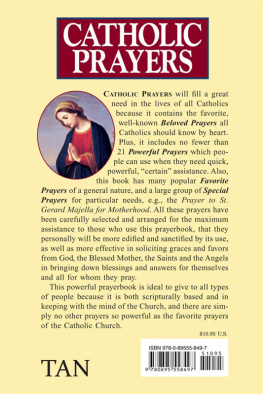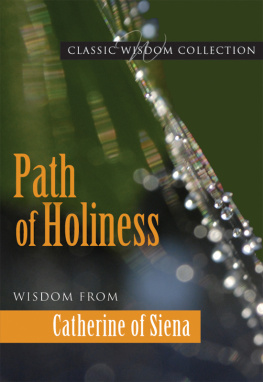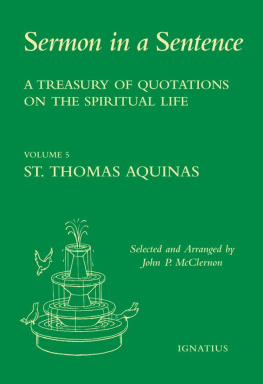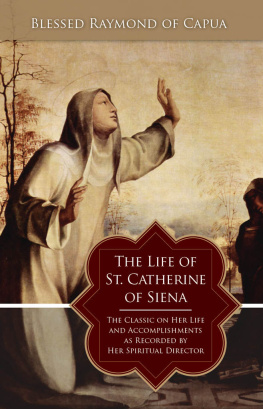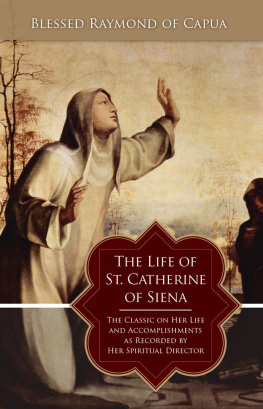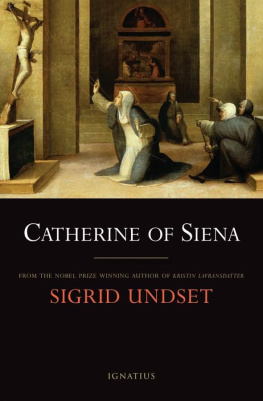

Nihil Obstat:
Joseph Wilhelm, S.T.D.,
Censor Deputatus.
Imprimatur:
Gulielmus, Episcopus Aridelensis,
Vicarius Generalis
Westmonasterii,
die 13 Dec., 1906
Copyright 2010 Saint Benedict Press, TAN Books.
TAN Books is an imprint of Saint Benedict Press, Charlotte, North Carolina.
Originally published in 1907 by Kegan Paul, Trench, Trubner & Co., Ltd, London. Photographically reproduced and republished by TAN Books and Publishers in 1974. Retypeset and republished by TAN in 2008. Republished in 2010 by Saint Benedict Press, TAN Books.
All rights reserved. With the exception of short excerpts used in articles and critical reviews, no part of this work may be reproduced, transmitted, or stored in any form whatsoever, printed or electronic, without the prior written permission of the publisher.
Published with the assistance of The Livingstone Corporation. Cover and interior design by Mark Wainright, The Livingstone Corporation. Typeset by Saint Benedict Press, TAN Books.
Cover Image: The Ecstasy of St. Catherine by Annibale Carracci (1560-1609); photo 1997 by Mauro Magliani; Alinari/Art Resource, NY.
ISBN: 978-0-89555-149-8
Printed and bound in United States of America.
11 10 9 8 7 6 5 4 3 2
www.tanbooks.com
www.saintbenedictpress.com

TAN CLASSICS
PREFACE
W HY should you read The Dialogue of St. Catherine of Siena ? Because God speaks through this great Saint to you, and me, and His whole Church. Remarkable though she was, Saint Catherine merely served as a vessel for the Lords message. In this spiritual classic, Gods message covers four topics: Divine Providence, Discretion, Prayer, and Obedience. Each of these treatises contains instruction and inspiration for your daily life as they did for Catherine and her contemporaries.
Born in 1347 as the second youngest of 25 children, Caterina Benincasa was an extraordinary woman that God blessed with extraordinary experiences. Christ, Mary, angels, and saints appeared to her from the time she was six; the Pope heeded her requests and returned home to Rome from Avignon; Christ gave her His stigmata; and God the Father spoke to her as a dear friend.
One reason The Dialogue is applicable to you is because you have the fortunate yet challenging experience of living in the current culture. While we have more tangible blessings, more freedoms, and more opportunities to search for truth, we are also besieged with a moral murkiness that seems to worsen with every generation.
Catherines Treatise of Divine Providence can remind you that God is alive and well in this world, awaiting an invitation into your life, into your familys life, into the life of anyone who forgets that God is omnipresentnot only present to all things, but present in all things, as a creator is present in his greatest work. Gods greatest work is not the creation of man, but the creation of God-made-man, Jesus of Nazareth, who brought from Heaven an infinite mercy upon a fallen people. And thus, the Lord explains that His Providence is most recognizable in the mercy poured upon us. His mercy is so great that if you carry yourselves with true patience, with grief for your sins, and with love of virtue for the glory and praise of My Name I shall not remember that you ever offended Me. Only an infinite God can make our gravest sins as if they never existed.
The Saints Treatise of Discretion can be a guiding light in a darkening world, where objective truth is shunned and relativism is promoted as the moral law. We live in an age where every choice is to be respected, where intolerance is the most grievous of sins, and where our children are taught to condone every act of their friends because it might be right for them . This treatise on discretion teaches, however, that moral virtue should be our guiding principle in all we doand there is never an exception.
Our Lord said to Catherine, if one single sin were committed to save the whole world from Hell, or to obtain one great virtue, the motive would not be a rightly ordered or discreet love, but rather indiscreet. The great Catholic mind of John Henry Cardinal Newman made a similar declaration in his Apologia : The Catholic Church holds it better for the sun and moon to drop from heaven, for the earth to fail, and for all the many millions on it to die of starvation in extremest agony than that one soul should be lost should commit one single venial sin, should tell one willful untruth, or should steal one poor farthing without excuse. It is the virtue of discretion that can assist the human mind in understanding that morality never grants the slightest compromise.
But it is the same virtue that simultaneously dictates that a soul should love her neighbor with such devotion that she would lay down a thousand times, if it were possible, the life of her body for the salvation of souls, enduring pains and torments so that her neighbor may have the life of grace. It is discretion that shows that a bodily sacrifice, as Christs very own, is the perfect sign of love. Perhaps for us this means selflessly attending to the family by cooking dinner or keeping house, mowing the grass or sitting through a long commute, or perhaps it means studying hard to prepare for a greater future. Life is full of laying down your life moments, and discretion tells us to embrace them. And if we are to obtain discretion in its fullness, we must turn to God in prayer, which leads us to the next treatise.
We live in a culture where a vibrant faith is many times ridiculed, where prayerful worship is often considered an anachronistic and meaningless ritual. Some applaud prayer as an exercise in self-awareness, or worse yet, self-worship. Even the faithful people that bend their knees to adore our Lord have innumerable distractions. It seems that every minute of our lives is filled with noise, sometimes from without, and sometimes from within. Our Lord explains, however, that too often we merely use vocal prayer rather than true mental prayer. Be sure that your prayers are more than just words, He instructs us. Be sure that your prayers are words of love.
Finally, the Treatise of Obedience is especially applicable to todays culture where there is little if any formality, respect for the old, or reverence for the sacred. We find our model of obedience in Jesus Christ, perfectly obedient to His Father. And with obedience comes a peace beyond any fleeting consolation the world can offer. On the flip-side, disobedience, like that of Adam before you, only brings isolation, fear, and misery. Remember that the gates of Heaven were closed by disobedience and reopened by obedienceand so will your heart be opened by humble obedience to Our Lord.
God may not speak with you directly, as He did with Saint Catherine, but He still provides you with the opportunity to hear His voice through these pages. The Dialogue of St. Catherine of Siena is a timeless classic because it contains a timeless message. Our Lord is waiting to begin His own dialogue with you in these pages and through the virtues that these pages will help you obtain.
J. Conor Gallagher
Vice President of Publishing
Corpus Christi, 2008
INTRODUCTION
I T WOULD be hard to say whether the Age of the Saints, le moyen ge norme et dlicat , has suffered more at the hands of friends or foes. It is at least certain that the medieval period affects those who approach it in the manner of a powerful personality who may awaken love or hatred, but cannot be passed over with indifference. When the contempt of the eighteenth century for the subject, the result of that centurys lack of historic imagination, was thawed by the somewhat rhetorical enthusiasm of Chateaubriand and of the Romanticists beyond the Rhine, hostility gave place to an indiscriminating admiration. The shadows fell out of the picture; the medieval time became a golden age when heaven and earth visibly mingled, when Christian society reached the zenith of perfection which constituted it a model for all succeeding ages. Then came the German professors with all the paraphernalia of scientific history, and, looking through their instruments, we, who are not Germans, have come to take a more critical and, perhaps, a juster view of the matter. The Germans, too, have had disciples of other nations, and though conclusions on special points may differ, in every country now at a certain level of education, the same views prevail as to the principles on which historical investigation should be conducted. And yet, while no one with a reputation to lose would venture on any personal heresy as to the standards of legitimate evidence, the same facts still seem to lead different minds to differing appreciations. For history, written solely ad narrandum , is not history; the historians task is not over when he has disinterred facts and established dates: it is then that the most delicate part of his work begins. History, to be worthy of the name, must produce the illusion of living men and women, and, in order to do this successfully, must be based, not only upon insight into human nature in general, but also upon personal appreciation of the particular men and women engaged in the episodes with which it deals. With facts as such, there can indeed be no tampering; but for the determination of their significance, of their value, as illustrative of a course of policy or of the character of those who were responsible for their occurrence, we have to depend in great measure on the personality of the historian. It is evident that a man who lacks the sympathetic power to enter into the character that he attempts to delineate, will hardly be able to make that character live for us. For in Art as well as Life, sympathy is power.
Next page
